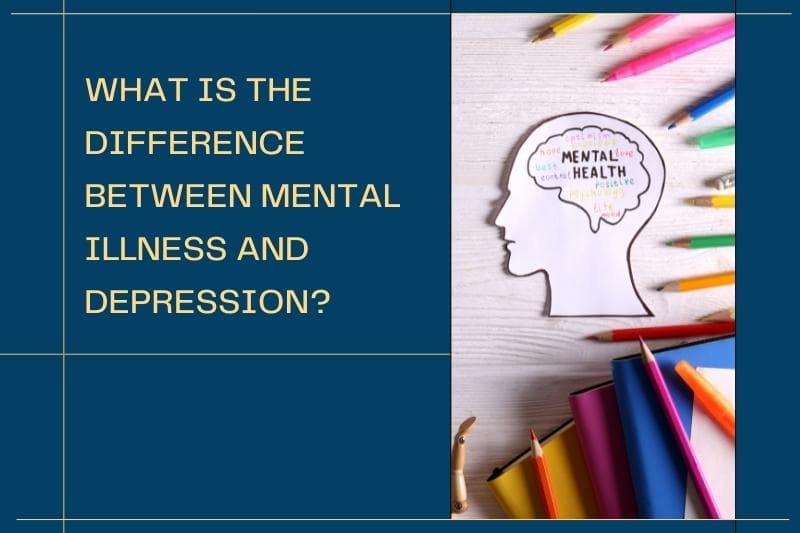What is the difference between Mental illness and Depression?

Experts at a mental hospital in Jamnagar say depression is a mental illness. It can be an intense and life-threatening condition. One might deal with more acute and chronic mental illnesses like schizophrenia, bipolar disorder, and other diseases that are marked by visual and auditory hallucinations.

If you are suffering from depression, you need to look no further as you can get the best possible help at the Rehabilitation Centre in Navsari.
The basics of depression
Our mind and body's well-being are interconnected and dependent on each other. Your mood and mental capabilities are also affected when your body feels sick, and at the same time, mental health also affects your physical health. Depression affects your mind and body. The symptoms might occur slowly or after one or many qualifying life events. Depression can be lonely and confusing and can also have a significant effect on your quality of life. There is generally a difference between mental illness and depression. Still, they are all interconnected, so one needs to first know about the root cause of depression and then get going with the mental illness.
Related Learning: How to Overcome Depression?
Symptoms of depression
The experts at a mental hospital in Mumbai say that depression is different from any other occasion or situation of sadness. People experience changing moods, anxiety and despair as a normal response to everyday life. If they notice that they constantly struggle to stay positive and gain pleasure from life, it can be a warning sign of clinical depression. Clinical depression generally lasts for at least two weeks, and it interferes with personal and professional lives. Individuals that suffer from depression might become reclusive and uninterested in the activities that generally bring happiness. They might be overwhelmed with feelings of guilt, hopelessness and sadness. Chronic fatigue also leads them to push friends and family away.
Some of the common symptoms of depression include
- Frequently crying
- Fixation of death or suicidal thoughts
- Paralysing indecision
- Loss of sex drive
- Feeling unmotivated to fulfil work
- Feelings of fatigue and low energy
Causes of depression
It is generally not known what the exact cause of depression is, but different factors are involved with mental disorders
Biological differences
Individuals with depression might appear to have physical changes in their brains, and the significance of these changes is uncertain.
Brain chemistry
Neurotransmitters are ideally occurring brain chemicals that play a crucial role in depression.
Hormones
Changes in the body's balance of hormones are generally involved in causing or triggering depression. The hormone changes typically result after pregnancy and during the weeks or months after delivery.
Inherited traits
Depression is quite common in people whose blood relatives also have the same condition.
Diagnosis
If you wonder if mental health includes depression, you are on the right page as the doctor can help you diagnose the issue.
Physical exam
The doctor might ask you to do a physical exam and ask different questions about your health. At times depression is also linked to underlying physical health problems.
Lab tests
For instance, the doctor might do a blood test known as the complete blood count or test your thyroid to ensure that it's functioning correctly.
Psychiatric evaluation
The mental health experts will ask you questions about your symptoms, thoughts, feelings and behaviour patterns. You also might be asked to fill out a questionnaire to help with these questions.
Types of depression
Symptoms caused by major depression can vary from one person to another. To clarify the type of depression, the doctor might add one or more specifiers. A specifier means that you have depression with unique features.
And she is distress
It is a type of depression with unusual restlessness or worries about possible events.
Mixed features
Simultaneous depression generally includes elevated self-esteem where you end up talking too much, and there is increased energy.
A typical features
Depression generally includes the ability to be temporarily cheered by happy events, increased appetite and excessive need for sleep. However, there is also a heavy feeling in the arms or legs.
Psychotic features
Here, the depression is accompanied by delusions involving personal advocacy or other negative themes.
Treatment
Medications and psychotherapy are generally effective for several people with depression. The primary care doctor can prescribe some medications to relieve the symptoms, but several people with depression generally benefit from seeing a psychiatrist or psychologist. You need to stay in the rehabilitation centre in Gujarat if you are suffering from severe depression.
The doctors might suggest you go through psychotherapy, where they would treat depression by talking about your condition related issues with a mental health professional. It is also known as talk therapy. The therapy helps you to learn to set realistic objectives for your life.







